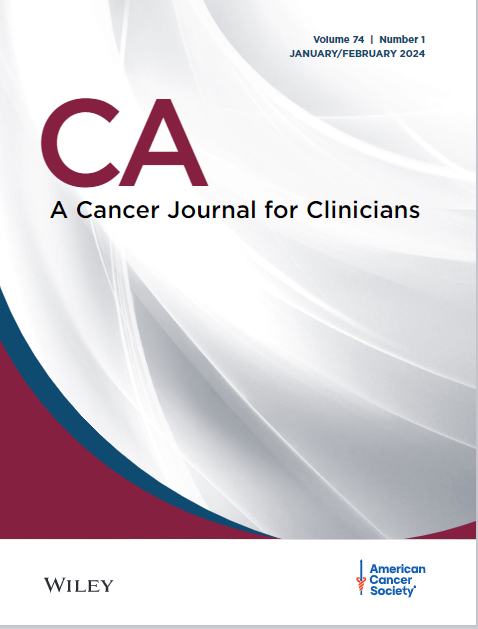肝细胞癌治疗的进展:临床医生当前和不断发展的治疗前景概述
IF 232.4
1区 医学
Q1 ONCOLOGY
引用次数: 0
摘要
肝细胞癌(HCC)是全球第六大最常见的恶性肿瘤,也是导致癌症相关死亡的第三大原因。随着系统性和局部治疗的进展,同行评议的系统性治疗指南发生了变化,疾病分期降低的可能性可能使一些晚期疾病患者最终接受部分肝切除术或肝移植,以达到治疗目的。本综述的重点是HCC的所有治疗方式,以现代实践改变的随机数据为指导。讨论了肝癌的手术治疗,包括切除和移植,这两种方法都有不断发展的生物可切除和可移植的标准,以及局部治疗(即治疗性栓塞、消融、放射和肝动脉输注)。历史和现代实践改变试验评估免疫治疗与靶向治疗晚期疾病,以及辅助全身治疗,也进行了总结。此外,本文考察了毒性的关键维度和以患者为导向的考虑,以确保对治疗影响的全面和平衡的论述。本文章由计算机程序翻译,如有差异,请以英文原文为准。
Advances in the treatment of hepatocellular carcinoma: An overview of the current and evolving therapeutic landscape for clinicians
Hepatocellular carcinoma (HCC) is the sixth most common malignancy and the third leading cause of cancer-related death worldwide. Contemporary advances in systemic and locoregional therapies have led to changes in peer-reviewed guidelines regarding systemic therapy as well as the possibility of downstaging disease that may enable some patients with advanced disease to ultimately undergo partial hepatectomy or transplantation with curative intent. This review focuses on all modalities of therapy for HCC, guided by modern-day practice-changing randomized data where available. The surgical management of HCC, including resection and transplantation, both of which have evolving criteria for what is considered biologically resectable and transplantable, as well as locoregional therapy (i.e., therapeutic embolization, ablation, radiation, and hepatic arterial infusion), are discussed. Historical and modern-day practice-changing trials evaluating immunotherapy with targeted therapies for advanced disease, as well as adjuvant systemic therapy, are also summarized. In addition, this article examines the critical dimension of toxicities and patient-oriented considerations to ensure a comprehensive and balanced discourse on treatment implications.
求助全文
通过发布文献求助,成功后即可免费获取论文全文。
去求助
来源期刊
CiteScore
873.20
自引率
0.10%
发文量
51
审稿时长
1 months
期刊介绍:
CA: A Cancer Journal for Clinicians" has been published by the American Cancer Society since 1950, making it one of the oldest peer-reviewed journals in oncology. It maintains the highest impact factor among all ISI-ranked journals. The journal effectively reaches a broad and diverse audience of health professionals, offering a unique platform to disseminate information on cancer prevention, early detection, various treatment modalities, palliative care, advocacy matters, quality-of-life topics, and more. As the premier journal of the American Cancer Society, it publishes mission-driven content that significantly influences patient care.

 求助内容:
求助内容: 应助结果提醒方式:
应助结果提醒方式:


